
In the mid-1970’s, my mom helped care for a Cambodian refugee family in Tulsa, Oklahoma. The family had narrowly escaped the genocide of the communist Khmer Rouge regime, fleeing to the United States with the assistance of a Tulsa-based missionary couple returning from Cambodia.
Almost 158,000 Cambodians entered the United States between 1975 and 1994.1 This family was part of the first wave, fortunate for them, as conditions in Cambodia worsened in subsequent years. The father of the family also escaped with them.2 That would not be the case in later arrivals of Cambodian immigrants, as the men were often placed into forced labor camps, or worse.
With the benefit of historical context, we might deduce this family was highly educated, perhaps with professional occupations back home. Hence, why they arrived as part of the first wave. They might have once been prominent citizens, though stripped of all possessions.
When people are destitute, we often use the expression, they arrived with nothing but the clothes on their backs. This family arrived wearing their pajamas. This is what it means to leave in the middle of the night, literally.
Mom would periodically drop by their apartment, replenish their food stock, take them to doctor’s appointments and generally check on them.
I have a vivid memory of visiting this family one day with Mom when I was four years old. I was just along for the ride, as four-year-olds often are… too young for kindergarten, but old enough to drag along.
I remember we drove to the apartment in our dark-green-almost-black, sporty Chevrolet Corvair. If I’m not mistaken, it was a 1969 vintage. Perhaps 1968.3 It was a groovy car back in the day, with black leather interior and a manual stick shift on the floor.
When the car was new, it looked something like this:
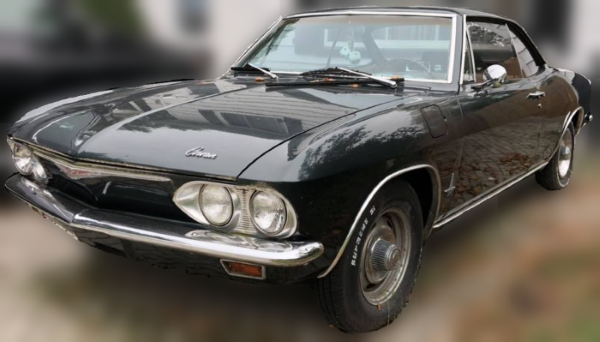
From the backseat, I had a clear view of the driver’s instrument panel, because I was standing up, looking over mom’s shoulder as we drove.
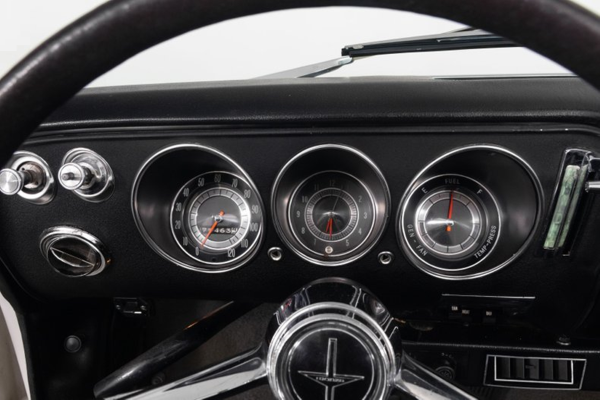
That may sound odd now, but cars of this vintage didn’t have seatbelts in the back.4 In fact, in larger cars, the prized place to sleep on long trips was the rear-window alcove, a platform nestled behind the back seat, below the rear window. It wasn’t uncommon to see children perched in this nook, fast asleep while driving down the highway.
Aside – My First Car
Our other car was a light-blue 1969 Ford Galaxie, pictured below. This behemoth of a car came equipped with perfect rear-window sleeping quarters. Tell me you couldn’t fall asleep like this on a long trip.
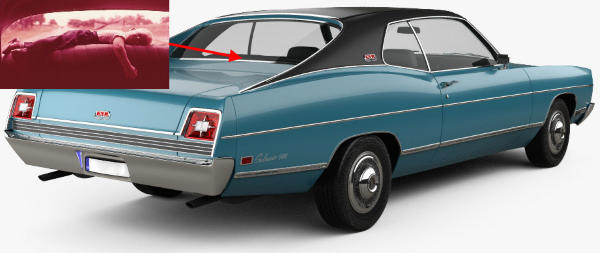
Incidentally, this would be my first car when I later turned 16. This sets a good precedent, I think, that your first car should be older than you. Vehicles often don’t survive 16-year-old drivers, especially if the car is fast. Strangely, for such a large car, the Galaxie could really accelerate.
“The Blue Whale”, nicknamed by my friends for obvious reasons, met its fate one Saturday evening, just before midnight, less than a year after I started driving… legally.
I was hanging out with a friend, at her house. I had already called my Dad twice asking if I could extend my informal curfew.
“Dad, we’re hanging out having fun. Can I stay out later?”
“Sure. Maybe be home around 11pm then?”, Dad asked.
“Yeah. Thanks.”
45 minutes later…
“Dad, we’re still hanging out. Can I stay longer?”
“Sure. But be home by midnight,” Dad’s intonation made it clear this latest deadline was not a candidate for extension.
Fair enough. Besides, there’s something about midnight. Once passed, it’s no longer just staying out late. It’s literally staying to the next day.
Looking back, I probably woke him by calling, twice. Mom was likely still waiting up, as mom’s do.
As the clock chipped away at my expected arrival time, a certain tension in my schedule began to mount into a proper dilemma. I had delayed my departure such that I had less time than required to arrive home by midnight. I couldn’t invent time-travel, but I could reduce travel-time… condensing it, by increasing the distance-per-unit-time = speed, which I did.
Sometimes increasing your speed accelerates your arrival. Sometimes it does the exact opposite.
If I could have magically paused time that evening to write a journal entry predicting 30 minutes into my immediate future, it would have concluded,
“And I arrived home on time, as planned. THE END.”
But this forecast would prove at odds with the more interesting outcome soon to unfold upon me.
Unpause time.
We lived in the country, on dirt roads. Heavy rains that evening had converted the dirt to mud. But the mud did not dissuade my speed. I had been driving since I was 7, thanks to Mom’s leniency when it came to driving in the country. Consequently, I was a more experienced driver than my age would normally imply. I also had quick reaction times, good hand-to-eye coordination, bravado, and the invincibility that accompanies youth. This is all part of the same recipe.
What I lacked was sufficient life experience to understand that unanticipated, out-of-the-ordinary circumstances most often cause wrecks. Extraordinary circumstances are precisely why we have speed limits mandating we drive slower than physics allow. Otherwise, half of us would drive at the brink-of-insanity most of the time.5 When you’re sixteen, this is not how you think. Or, at least, not how I thought. Actually, I don’t recall thinking about this at all, or anything like it, which I suppose is the point here.
My sole mission: arrive home by midnight.
Given the late departure, warp-speed was required. Inevitable really.
Unbeknownst to me, the heavy rainfall had washed away the dirt in front of the newly constructed concrete bridge. The dirt, now missing, no longer fulfilled its main function, to smoothly connect the road to the bridge. So, the unexpected circumstance for me that evening included the bridge being a foot higher (30 cm) than the road. This can make for a rather abrupt road-to-bridge transition.
This was more like a troubled bridge over water, not a bridge over troubled water.6
Google Maps shows the 2020 view of the same bridge (upper left). From this, I illustrated a visual re-enactment, adding some mud and obstacles.7 To be more accurate, it would also need to be dark.
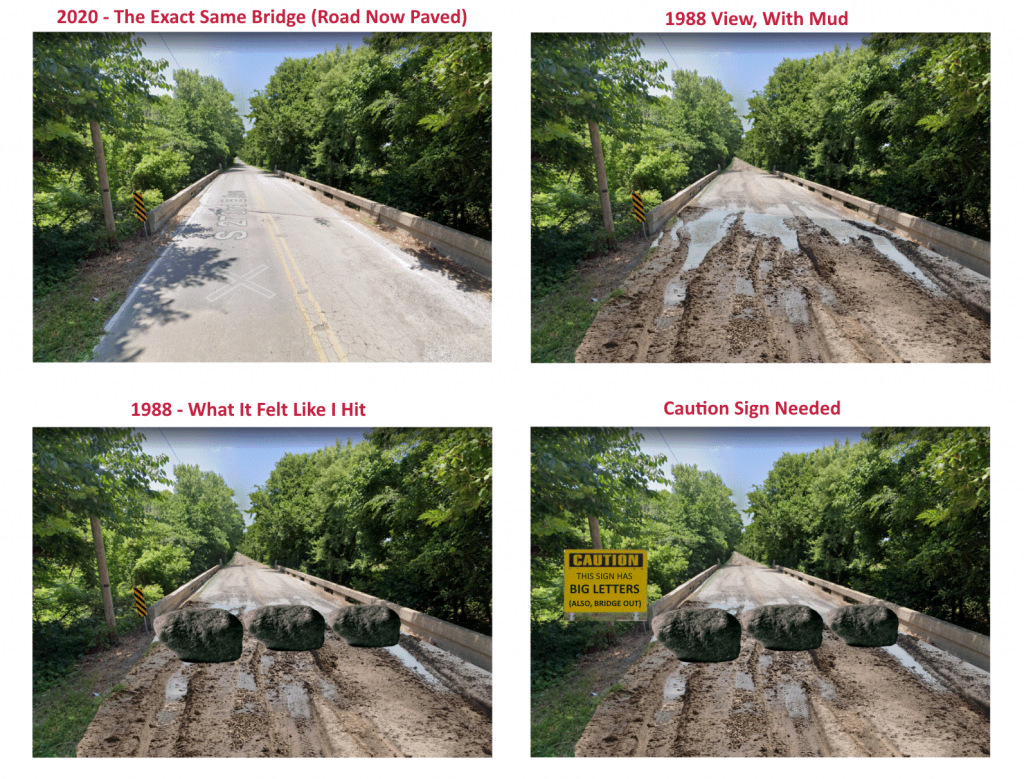
Although I was wearing my seat belt (which were only lap belts at the time), my head still hit the ceiling of the car’s interior, surprisingly hard as I recall.
The car came to a sudden stop on the bridge and refused to budge, or start.
Mission fail.
I was definitely not going to be home by midnight. And the car had unknown damage. This is not really the kind of news you want to break to your Dad, while simultaneously waking him for the third time that evening.
In a case of super-human strength, I managed to push the old Ford off the bridge, to the side of the road. It didn’t seem safe to leave it in the middle of the bridge in the dark.
I then slogged through the mud in darkness to the nearest house, knocked on the door and asked to use their phone.8 They wrote the number down and called for me, after first greeting me at the door with a gun. It was dark after all, midnight, in the country, in Oklahoma. I should have expected that.
I sat on the fence at the end of their driveway and waited for Dad to arrive.
Continuing the long tradition of dads bailing out their kids with car problems, my Dad showed up more than an hour later, in the pickup, loaded with various tools he might need for repairs.
With the benefit of headlights from the pickup, we could see the problem. When the car hit the lip of the bridge, a foot-tall wall of concrete, the front-axle decided to stop while the car continued its journey. Where we once had a whole car, we now had a front-axle with wheels and a second part, the rest of the car. Something like this:
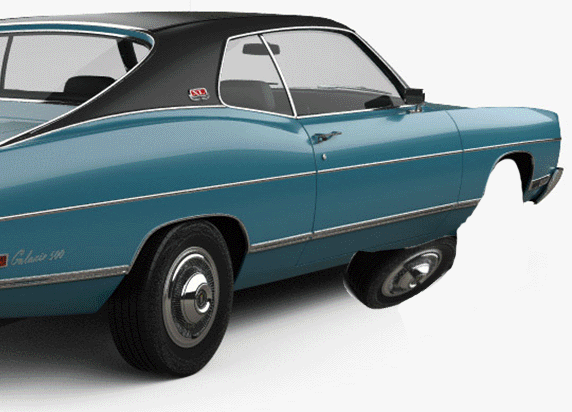
I’m still not sure how I pushed the car off the bridge… but I do remember it took all my strength, the kind of effort that pushes all your blood to your head and makes your neck veins pop out.
Just before we headed home, Dad drove his pickup across the bridge, turned around and drove back onto the bridge (slowly), to replicate the incident. This was clearly to assess how hard the car hit (and thereby deduce if I had been driving too fast). The pickup managed the transition from road to bridge, but it was a significant obstacle, even for the pickup. He never blamed me for wrecking the car nor ever mentioned it was my fault. I assume he reasoned, Yeah, you wouldn’t expect the bridge to be uneven with the road like that. That would be difficult, if not impossible, to avoid, especially in the dark. Good logic Dad… and mostly true.
Somehow Dad got the old Ford started and drove it home, very slowly. I think the front axle was more like a sled in the mud, pushed by the rear-wheel drive. I drove the pickup home.
End Aside
Back to driving the Corvair to see the Cambodian family…
I remember the Corvair’s speedometer was lifeless, pegged at zero, regardless of our speed. Apparently, this was a superfluous instrument because my parents never fixed it.
“How do you know how fast you are going if the speedometer doesn’t work,” I asked.
“After a while, you just kind of know,” Mom replied.
How can you “just know” how fast you are going?
The conversation paused as I marveled at the inexplicable capacity of adults to “just know” something like this.9 I pondered this, perhaps as much as 3 seconds, an eternity when you’re four. How someone could “just know” anything was apparently too perplexing to resolve.
This idea left an impression on me… but likely only because it was reinforced by the peculiarity of the visit with the Cambodian family, still yet to come, but on the same excursion – a single story somehow all wrapped (or entangled) together.
Momentous events attach and anchor memories from seemingly minor adjacent details.
Refugees >>> Vehicles. Speedometers. Grocery bags. Rings. (The last two discussed below).
It’s as if the more impactful event envelops the surrounding interactions, and includes them as part of the memory as well, just in case these are also important to later reconstruct event sequencing such that we might learn from our memories.
“I just drive traffic speed,” Mom clarified, explaining this meant the approximate speed of the surrounding cars. I don’t think I fully reconciled this notion that going the same speed as others somehow told you how fast you were going,10 as if the answer didn’t fully satiate my curiosity.
The Corvair’s Fate
Not long after my memorable Cambodian family visit, we moved from the suburbs of Tulsa to the farm outside town (when I was five). Hence, the dirt roads.
Unlike the Ford Galaxie that died suddenly, in a car wreck, the Corvair had emphysema, and slowly withered away until one day was its last day to self-propel.
The Corvair’s air-cooled radiator, covered in dust from the dirt roads, just couldn’t manage the required heat exchange to sufficiently cool the engine. The Corvair was thus relinquished to non-functional status, parked beside the driveway for years, presumably awaiting resurrection when my brother or I would turn 16, get our driver’s licenses and need a car. But that would not be this car’s fate.
Many years later, that same car would rust to death. It eventually looked something like this (except with more rust, flat tires and tall weeds growing around it).
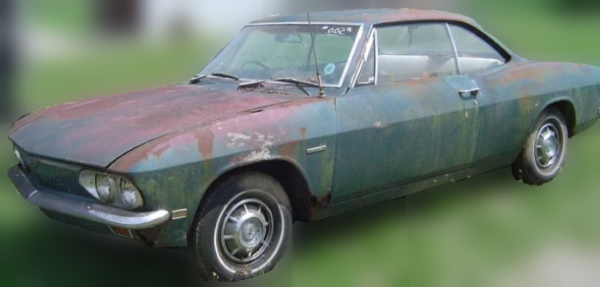
Back to Our Refugee Visit
We must have stopped at the grocery store on our way to their apartment. I do not remember shopping, but infer it was part of the excursion because we carried brown paper bags with groceries up the stairs to their second-floor apartment.
Yet Another Aside – Grocery Bags
Remember those brown paper bags from the grocery store of your youth? They were stiff when new and came with two prominent features. They were folded in such a complex way that it was easier to solve a Rubic’s cube than to refold them back to their original form. And, they had a certain unmistakable smell, lingering hints of papermill, the manufacturing Eden of brown paper bags.
You likely haven’t given that scent much thought, but if you are over 40, you know the smell. If you were to close your eyes while someone placed a brown bag in front of you, from the scent alone, you would be able to say without hesitation,
“That’s a brown paper bag from the grocery store,” and part of you, in an instant, warps back in time.
The smell is that distinctive. You might even guess some of the items in the bag by their aromas as well, mixed with whiffs of paper bag. Maybe there were some grapes in there or greenish bananas, or something else fun to eat. But not cookies. Cookies were made from scratch.
You have, just now, reached into your mind’s storehouse of experiences and have called forth smell-data you didn’t realize you had retained. Scents, imprinted upon our memories, somehow evoke powerful sensory experiences upon recollection. Smells, more than the other senses, can warp us back in time, to our distant childhood, and to related experiences.
I cradled this smell in front of me as we delivered the bags of groceries to the Cambodian family. This I remember.
End Aside
In retrospect, I wondered if we delivered food items that seemed completely foreign to our Cambodian friends. I suppose most everything was foreign to them, by definition. But some foods are “more foreign”.
My guess is, they had no idea what to do with certain items brought to them by well-intentioned American families just trying to help. Cranberry sauce? Okra? Black-eyed peas? Cornbread mix? Some of these things are foreign even to U.S. citizens living north of Kansas. I’m not saying that’s what we brought, I was too young to remember, but I also wouldn’t be surprised if at least one of these items was in the bag.11
Anyway…
The idea was to deliver the groceries to replenish their supplies and generally check on them. This family had absolutely nothing, except what people donated and brought them. In other words, they were completely dependent on the mercies of strangers for their basic sustenance. This must have been an uncertain way to live. I’m sure they were weary, feeling small.
Mom did her best to communicate with the family through hand gestures.
It’s surprising how much people can converse, across cultures, by pointing, arm waving and exaggerating facial expressions. Through this, it was obvious to me, even at my age, that the family was thankful. Very thankful. Especially the mother.
Before we left, the Cambodian mother gave my Mom her ring – the one she was wearing – as a token of her appreciation. The ring, still warm from her finger, had four red stones set in a gold mount. Through further hand gestures, we learned there was one stone for each of her children and one for her husband.
And with that, she literally gave my Mom her last and only possession. It was clearly precious to her. Mom tried to refuse, but the Cambodian mother insisted. Absolutely insisted.
This last exchange created the vividness for my memory of this event. It left quite an impression on my 4-year-old self, as you might imagine. I met, for the first time, someone truly in need, nearly helpless and fully dependent on the graciousness of strangers. And yet, she simultaneously gave an invaluable gift, demonstrating extreme gratitude, even when evening falls so hard.
This ring, if it still exists, is the one item I most wish to inherit. Its value is symbolic, simultaneously representing the seemingly insurmountable struggles of much of the world, juxtaposed against the loving interactions of two young mothers – one climbing out of dire circumstances and the vicissitudes of fortune, fighting for her family with only a small gift of appreciation as currency – and another with a willingness to voluntarily act on her personal responsibility to help set the world straight, against all odds, one relationship at a time, like a bridge over troubled water.
I can only hope this life-model has generational legacy… and that we too may echo, I will lay me down to those in need.
UPDATE (October 2020) – Mom came to visit last week, the first time we have seen her since February, due to Covid, even though my father passed away in July. Strange times. Upon arriving, Mom handed me the ring mentioned in the story above. I was honored and will treasure it until perhaps one day it might be reunited with its rightful owners from Cambodia.
If you liked this piece, you’ll probably enjoy reading about how I got lost in Ukraine, alone, in the dark, after midnight… or maybe about the time I was Detained by the Police.
Follow Past Midway if you would like an email notification of new posts.
FOOTNOTES:
- Source.
- On the off-chance one of my readers knows the family and might connect back after all these years, Mom recalls the father’s name was Kuch Kong.
- Car enthusiasts would know the vintage from the picture. I’m definitely not a car guy.
- Dad would later install seatbelts as a DIY aftermarket safety improvement. Dad was avant-garde when it came to safety.
- Jackie Harper once drove some of us home from school in the back of his restored, vintage pickup. Let’s just say at one point, he was going 55 mph (88 kmh) over the speed limit. We had to huddle behind the cab because 100 mph wind is stronger than one might think.
- Simon & Garfunkel. 1970.
- I tried way too long to draw the bridge taller than the road… to no avail. Boulders are more visually stunning anyway.
- A mobile phone would have been handy, but this was 1988.
- Marvel is what we do when we find ourselves at a neurological dead-end.
- I certainly didn’t fully appreciate the broader societal and philosophical implications here. Don’t gloss over this point.
- On a recent phone conversation with Mom to rehash this memory and fact check, I learned that the missionary couple suggested Mom bring a 25-pound bag of rice, which Mom did. I guess I wasn’t carrying that bag.
That some people survived genocidal slaughter by moving half way around the world and relying on the kindness of strangers is only slightly more amazing than the fact that so many of our generation survived sleeping in the back windows of cars or driving home late at night as teenagers. Thank you, Andy, for reminding us all that the safety/freedom ratio has ever been a changing value in this country!
Nailed it. Thanks Eric.
The back window sleepers that didn’t survive aren’t here to tell us about it, so we’ll never know the survival rate!
As the mom of three guys, these car stories are ones I hope to hear about ONLY when my teens are past midway. And I hope they have a few about me that are least a portion as kind as you have about your mom. Excellently written as always…I felt as if I was in the apartment with you crying at your mom’s kindness and the Cambodian family’s bravery. And in the passenger seat or truck bed (heaven help our teen-agers and their invincible unreality), begging you to develop your fully functioning noggin.
These growing up stories remind me of Rick Bragg’s collections, which I hope is not akin to comparing your saxophone skills to Kenny G.
Jenni – thanks for commenting. Boys all have these stories. We just wait until we’re about 50 before we tell our moms.
Well, this one made me cry. All kinds of emotions are flooding right now not the least of which is wondering what happened to that precious Cambodian family. Back then, the world didn’t know English as it does now so even the young people (they were pre-teen & teen age) were starting from scratch in that area. Clinic visits would reveal the presence of intestinal parasites, but, other than that, their health was not adversely affected by their circumstances. I suspect they did well & somewhere in this great country, there are now very Americanized latter generations going above & beyond.
Regarding the car… it was purchased by your dad, brand new, in 1965. It was a Corvair Monza. He had custom ordered it (the first & last time he ever did that), & then was fearful it was not going to arrive in time for our honeymoon. It arrived the afternoon of the day for our wedding. It was purchased with a loan based on the prospects of our first jobs post college graduation. (It was paid off in 8 months & was the last car we bought with a loan.) Now, the fate of the car…after it quit running (& I am amazed looking back that your dad didn’t just fix it since he could repair just about anything), dad gave the car to nephew Kenny. It did not rust away. I loved that vehicle too much to have ever allowed that to happen. And, I suspect your dad did as well. (I am wondering if your memory failed you here or if you took poetic license.)
The ring. I had forgotten about it until you mentioned it to me. It is beautiful, six stones in a gold setting. (Sorry, but you haven’t seen the ring in years because I never had it sized to fit my larger finger). It would be interesting to have it appraised. But, your point is that she gave it to me out of gratitude. I had to accept it even knowing she was giving away something precious. It was humbling. And, now I give it to you knowing one of your Swedish/American daughters will treasure it someday.
One other thought, in relating the car meets concrete, you glossed over being met with a gun pointed at you when you knocked on that door. That’s because you have the adult perspective now. But, having that gun pointed at you was no small thing at the time. I think that softened any fear you might have had over having wrecked the car. I think you were genuinely happy to see your dad regardless of any consequences. And, I am pretty sure your dad saw that as well because he didn’t dole out any punishment other than the fact that you had lost the car.
Thank you, Andy, for this little journey down memory lane. Even if it did make me cry.
Thanks Mom. Six stones, not four. While I am tempted to edit the text to correct for this detail, I think I’ll leave it incorrect to highlight the fragility of aged memories.
And, if someone reading this is able to connect us to this family, after all these years, I think it would be wonderful to reunite the ring back to the family.
Gift back to the family…that would be AWESOME!!! How I wish I could remember her name & am still hoping it will come.
Re: the corvair. I stand corrected. It did sit in your grandparents’ pasture until a passerby noticed it & bought it from Kenny to, hopefully, be restored.
Thanks for the memories! We too had a car with a much coveted “window bed.” I knew which story was coming when you started in about the dirt road, I was already laughing knowing where it was going. I can attest riding in your car on that dirt road was harrowing experience and not for the faint of heart! I can’t even imagine it in the bed of a pickup.
Very good reading Andy, I enjoyed this travel back in time and the stories it included.